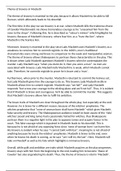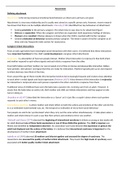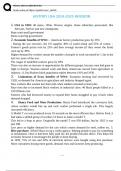Theme of bravery in Macbeth
The theme of bravery is essential to the play because it allows Macbeth to be able to kill
Duncan, which ultimately leads to his downfall.
The first time in the play we see bravery is at war, where Macbeth kills the traitorous thane
of Cawdor Macdonwald. He shows tremendous courage as he “unseamed him from the
nave to the chops”. Following this, he is described as “valour’s minion” which highlights his
bravery. Because of Macbeth’s bravery, others fear him, as a “hare the lion”, where
Macbeth is the fearless lion.
Moreover, bravery is essential in the play since Lady Macbeth uses Macbeth’s bravery as a
weakness to convince him to commit regicide. In the 1600’s, men’s traditional
characteristics were strong and brave in comparison to the weak and manipulative woman.
The theme of bravery allows Shakespeare to portrays these characteristics in the play. This
is shown when Lady Macbeth questions Macbeth’s bravery when he contemplates the
murder. Lady Macbeth says “when you durst do it, then you were a man”. As men are
associated with bravery, Lady Macbeth tells Macbeth he is weak, which Macbeth cannot
take. Therefore, he commits regicide to prove he is brave and a ‘man’.
Furthermore, when prior to the murder, Macbeth is reluctant to commit the heinous act,
but Lady Macbeth gives him the courage to do so. This bravery Lady Macbeth instils in
Macbeth allows him to commit regicide. Macbeth says “we fail?” and Lady Macbeth
responds “but screw your courage to the sticking-place and we’ll not fail”. Thus, it is evident
that if Macbeth is brave and courageous, he’ll be able to commit the murder. This suggests
that Macbeth’s bravery allows him to fulfil his ambition.
The brave traits of Macbeth are clear throughout the whole play, but especially at the end.
However, he is brave for a different reason, because of the witches’ prophesies. The
witches prophesise that “none of woman born shall harm Macbeth” which gives Macbeth
false security and bravery. The Shakespearean audience would’ve been aware of the ‘risks’
witches’ posed and king James had a passionate hatred for witches, thus Shakespeare
portrays them in a negative light in the play to appease James and acquire favour in his
court. This false courage which is ingrained in Macbeth leads to his downfall. This is
because he is not afraid of any opposing force since ‘none of woman born’ can harm him.
His bravery is evident when he says “I cannot taint with fear”, meaning he is not afraid of
anything because he trusts the witches’ prophesies. Macbeth is brave to the end, even
when he knows his death is coming, as he says “yet I will try the last”. Here, Macbeth will
take on Macduff as well as his fate which highlights is immense bravery.
Overall, while guilt and ambition are traits which Macbeth acquires as the play progresses,
bravery stays with him from the beginning to the end, leading him to become ‘thane of
Cawdor’ but also engendering his death. Thus, the theme of bravery is vital in ‘Macbeth’.
The theme of bravery is essential to the play because it allows Macbeth to be able to kill
Duncan, which ultimately leads to his downfall.
The first time in the play we see bravery is at war, where Macbeth kills the traitorous thane
of Cawdor Macdonwald. He shows tremendous courage as he “unseamed him from the
nave to the chops”. Following this, he is described as “valour’s minion” which highlights his
bravery. Because of Macbeth’s bravery, others fear him, as a “hare the lion”, where
Macbeth is the fearless lion.
Moreover, bravery is essential in the play since Lady Macbeth uses Macbeth’s bravery as a
weakness to convince him to commit regicide. In the 1600’s, men’s traditional
characteristics were strong and brave in comparison to the weak and manipulative woman.
The theme of bravery allows Shakespeare to portrays these characteristics in the play. This
is shown when Lady Macbeth questions Macbeth’s bravery when he contemplates the
murder. Lady Macbeth says “when you durst do it, then you were a man”. As men are
associated with bravery, Lady Macbeth tells Macbeth he is weak, which Macbeth cannot
take. Therefore, he commits regicide to prove he is brave and a ‘man’.
Furthermore, when prior to the murder, Macbeth is reluctant to commit the heinous act,
but Lady Macbeth gives him the courage to do so. This bravery Lady Macbeth instils in
Macbeth allows him to commit regicide. Macbeth says “we fail?” and Lady Macbeth
responds “but screw your courage to the sticking-place and we’ll not fail”. Thus, it is evident
that if Macbeth is brave and courageous, he’ll be able to commit the murder. This suggests
that Macbeth’s bravery allows him to fulfil his ambition.
The brave traits of Macbeth are clear throughout the whole play, but especially at the end.
However, he is brave for a different reason, because of the witches’ prophesies. The
witches prophesise that “none of woman born shall harm Macbeth” which gives Macbeth
false security and bravery. The Shakespearean audience would’ve been aware of the ‘risks’
witches’ posed and king James had a passionate hatred for witches, thus Shakespeare
portrays them in a negative light in the play to appease James and acquire favour in his
court. This false courage which is ingrained in Macbeth leads to his downfall. This is
because he is not afraid of any opposing force since ‘none of woman born’ can harm him.
His bravery is evident when he says “I cannot taint with fear”, meaning he is not afraid of
anything because he trusts the witches’ prophesies. Macbeth is brave to the end, even
when he knows his death is coming, as he says “yet I will try the last”. Here, Macbeth will
take on Macduff as well as his fate which highlights is immense bravery.
Overall, while guilt and ambition are traits which Macbeth acquires as the play progresses,
bravery stays with him from the beginning to the end, leading him to become ‘thane of
Cawdor’ but also engendering his death. Thus, the theme of bravery is vital in ‘Macbeth’.






